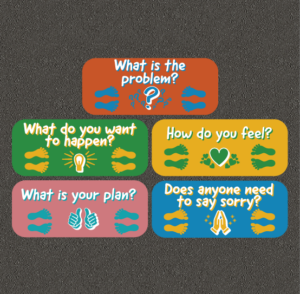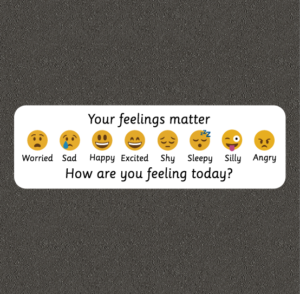Nurturing Emotional Well-being Through Play
For children, the playground is more than a place to burn off energy; it’s a space where they can relax, express themselves, and find joy in being part of something bigger. Play has an incredible ability to nurture emotional well-being, helping children build resilience, manage stress, and develop essential coping skills.
Let’s explore how thoughtful playground design and engaging activities can support children’s emotional health, making the playground a haven for growth and happiness.
The Link Between Play and Emotional Well-being
Play is a natural stress reliever. Whether it’s the thrill of a game, the freedom of imaginative play, or the calming rhythm of a hopscotch sequence, these activities provide children with a way to process their emotions. Through play, children can:
- Build Resilience: Overcoming challenges in a game teaches perseverance and the value of effort.
- Express Feelings: Role-playing games give children a safe space to explore emotions like frustration, joy, or curiosity.
- Experience Joy: The sheer fun of play releases endorphins, helping children feel happier and more connected.
Creating Playgrounds That Support Emotional Well-being
- Calming Zones:
Not every child seeks high-energy games all the time. Calm, sensory-focused areas provide a quiet retreat for children who might feel overwhelmed. Thermoplastic markings for mindfulness trails or quiet zones can encourage relaxation and focus. - Expressive Play Areas:
Spaces designed for creative activities, like storytelling zones or chalk-friendly drawing areas, allow children to express themselves freely. These activities can be especially beneficial for children who find it easier to communicate through art or movement rather than words. - Team-Oriented Games:
Cooperative games, like mazes or group-based obstacle courses, foster a sense of belonging. Feeling part of a team can help children build confidence and alleviate feelings of isolation.
Empowering Educators and Parents
Educators can use structured play sessions to introduce themes of emotional well-being, such as teamwork, mindfulness, or gratitude. Meanwhile, parents can advocate for playground designs that prioritise emotional health, ensuring their children have access to inclusive and supportive play spaces.

The Long-Term Benefits of Emotionally Supportive Playgrounds
Children who feel emotionally supported on the playground are more likely to carry those positive experiences into the classroom and beyond. They develop stronger social bonds, higher self-esteem, and a more optimistic outlook—qualities that lay the foundation for a healthy, happy future.

A Playground with Purpose
Every playground has the potential to be more than just a place to play—it can be a sanctuary for emotional growth and well-being. With the right designs and activities, schools can ensure that every child feels seen, valued, and supported.
Want to create a playground that supports emotional well-being? Explore our range of thermoplastic playground markings and discover how they can transform your play area into a space of joy, inclusion, and growth. Contact us on 0330 124 2750 or at sales@thermmark.co.uk.

